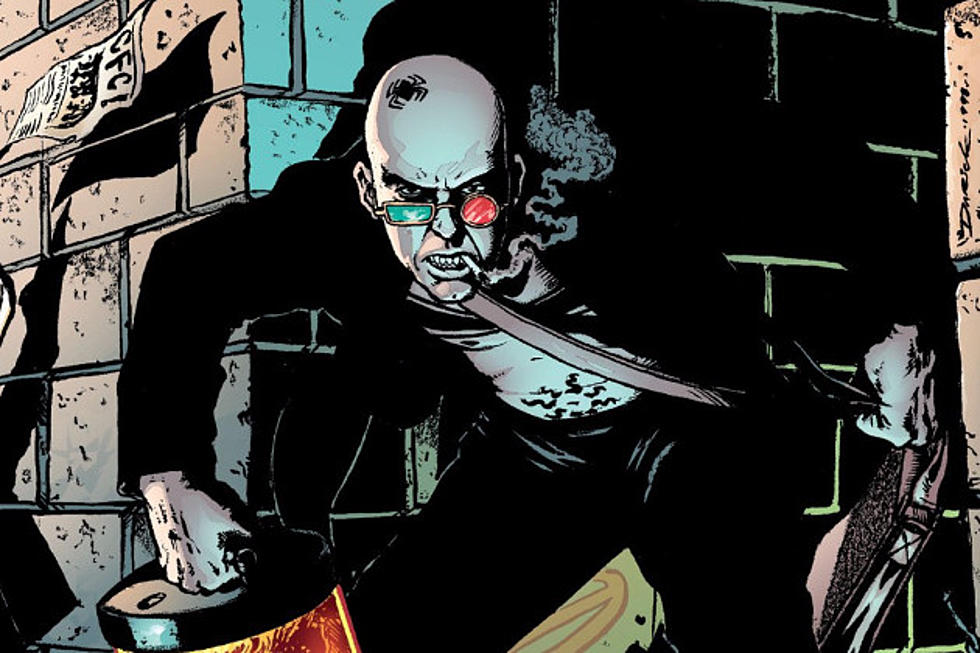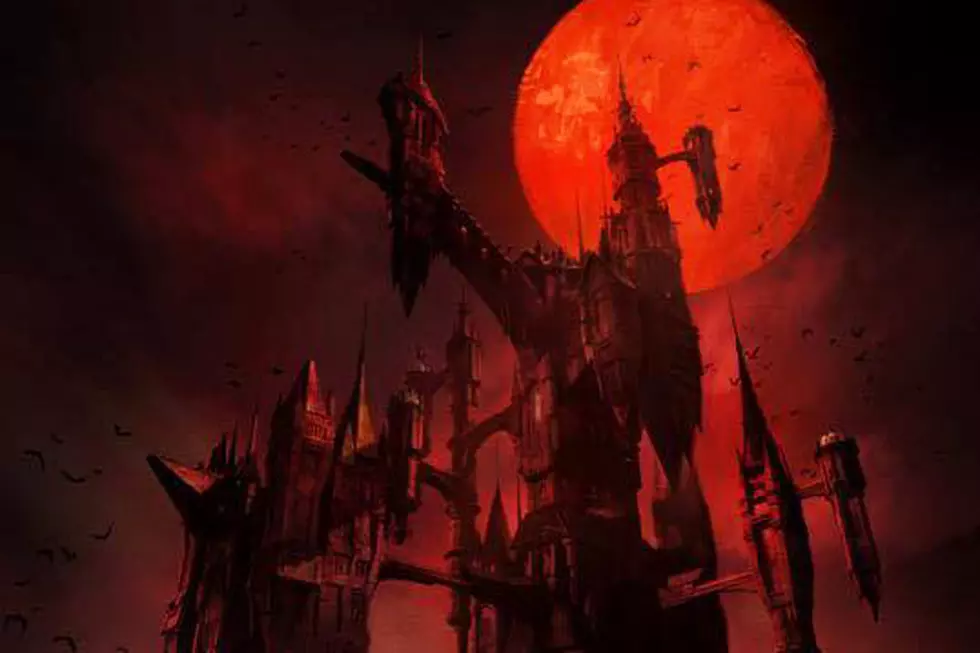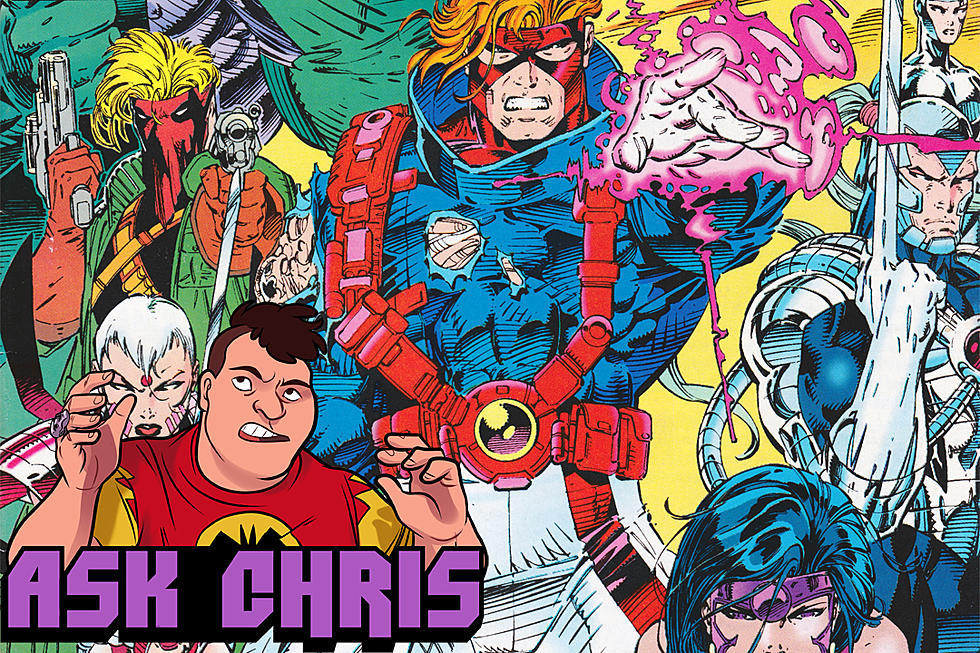
Filthy Assistance: Revisiting ‘Transmetropolitan: Lust for Life’
In the 1990s, Warren Ellis and Darick Robertson foresaw a future of twisted behavior, renegade politics, and uncontrollable technology in Transmetropolitan. We're revisiting the series book by book, because in a time of unrest and uncertainty we could all use some Filthy Assistance.
In book two, Lust For Life, the world is brought into sharper relief as the new and the old crash into each other repeatedly, leaving our characters dealing with the fallout. Spider Jerusalem also confronts assassins putting a hit on his life as part of a convoluted scheme tied up in a messy divorce --- in a storyline that may go a bit too far...
In the second volume of Transmetropolitan the world --- and our narrator and guide to it --- come into focus more clearly.
Three one-shot stories open the volume, which was written by Ellis, with pencils by Darick Robertson, inks by Rodney Ramos, colors by Nathan Eyring, and letters by Clem Robbins. In the first, Channon’s boyfriend is leaving her, joining a transhumanist movement where he is literally going to be uploaded to the cloud. (If Dropbox formed a human face and created flowers, I might be more forgiving of those times there’s a data breach that leaks all its files to the world.)
Neural uploading --- nicknamed “braintaping” in the cyberpunk fiction I read growing up, back when magnetic tapes existed and the occasional dinosaur roamed the Earth --- is a long-speculated end goal for transhumanist perspectives on the human race, a cure for death itself. Heaven on Earth. Except that in Transmetropolitan, anyone selling you on Heaven is either lying to you or to themselves.
One of Channon’s boyfriend’s first acts as a foglet is to get intimate with another foglet, right in front of Channon, and the story ends with Spider in the unique position of running out to comfort Channon. All this brings into sharp relief one of the running themes of Transmetropolitan: that better cars and better computers didn’t make us better people, and the worst frailties of the human condition are frailties of compassion and the heart.
Nowhere is this better illustrated than in the second story, arguably the best story in all of Transmetropolitan, and certainly my favorite. Spooling out of a single panel of shell-shocked street people in the first issue, this story takes the promise of the post-death future and reaches back into the past, to tempt us with it; you too, can be immortal, since in the future death will have been conquered.
But none of us float alone in a void; all of us are shaped by the forces around us. (This life extension service is specifically only available in first-world countries; like William Gibson said, the future is here, but unevenly distributed, and the fly in the ointment of transhumanism is that one-third of the world still lacks electricity.) We have family; we have friends; we have a society we understand, jobs we know how to do, favorite hobbies, favorite keepsakes, wedding bands and knickknacks, and our favorite coffee mugs.
For Mary, the subject of the story that Spider tells the reader, all of this is stripped away as she is reborn in a future that doesn’t preserve any of that (or it does --- see the next story --- but again, the future is distributed unevenly). She is even stripped of most of her voice --- there is only the bare snippet of a conversation with a faceless man, the rest conveyed via Spider’s writing, which forces us to look at her at a remove, and to empathize with her anyways.
She is shoved out into the world without all of the context that makes her her, and she is lost without it, realizing just how small in the face of the towering forces of society we all are, buoyed along by an ocean we can’t tame and a wind we can’t predict. The future is a place where death has been beaten back, making life so cheap that any excuse not to care about it is one that society’s taken.
The last of the three one-shot stories is about the future reaching back into the past via different means, sending people back to live out the ultimate in LARPing, fully stepping into a long-decayed culture. That no-one thinks to match up the Revivals of the previous story with one of the cultural preserves from this story, where they might live in comfort, is a testament to how much the City suffers from institutional failure; an obvious solution forgotten because, again, not enough people care.
One of the preserves is less a preserve of times long past and more a quarantine zone where legal regulations of technology are relaxed, and it sets up --- years in advance --- Spider’s tragic ailment, a testament to the power that playing the long game can bear out, much as it did with Preacher. Robertson and Nathan Eyring are the stars of this one shot, illustrating a variety of cultural periods and a realm of future-tech beyond the neon-cyberpunk aesthetic of the City proper.
The final story in the book, clocking in at multiple chapters, is an extended shaggy dog story with a literal shaggy dog (okay, a sentient shorthaired pitbull who also is a cop, because comics are great). Spider is deprived of his legal protections and attacked in his home…
… and the artful cussing and choreography of, say, Preacher is a million miles away. The fight is bloody and horrifying, making Spider sick, and robbing him of his gift with words.
It also does some notable worldbuilding, based around Ellis and Robertson’s conception of the future as monocultural in many ways, down to the French language being eradicated in the name of the cultural supremacy of English, showing us a world where colonialism marches on in search of new targets to eradicate. It also gives us naked newscasters, which became a reality one year later. (Okay, so that wasn’t a difficult one to predict.)
It also features an extremely sketchy plot point, in the form of Indira Ataturk, the woman on the inside who helped orchestrate an assassination attempt on Spider as part of the longest, messiest divorce in history. In The Word’s medieval-style interrogation room, she confesses that due to at best criminal negligence and at worst deliberate action, going on assignment with Spider exposed her to the electronic equivalent of an aphrodisiac, and she was filmed having sex with an entire room.
While underage.
This feels like it crosses a line, since she’s made out to be a villain of a sort, but her motivation is honestly 100% justifiable. Spider is meant to be a good journalist, but this is the action of a bad one; he’s supposed to be a charming bastard, “our bastard,” but this just makes him into a bastard. It barely comes up again, other than a running gag about how Spider treats his assistants, and I have to ask if the creators decided this was best swept under the rug.
Of course, nothing stays buried under the rug forever, especially in politics, and in the next volume Spider confronts the journalist’s natural enemy: politicians. We'll see you all next time, two weeks into the future.
If you would like to support good journalism — which never stops being necessary in any era — these organizations can always use your help:
More From ComicsAlliance

![Jenny Sparks Enters The Scene In Ellis And Davis Hunt’s ‘The Wild Storm’ #3 [Preview]](http://townsquare.media/site/622/files/2017/03/TWS_Cv3_000.png?w=980&q=75)







